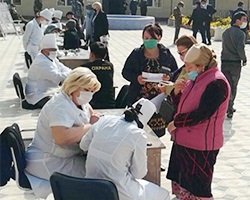

Center for Disease Analysis Foundation (CDAF)
A pilot project in Uzbekistan has demonstrated that trained and empowered primary health care professionals help increase testing and improve management of chronic viral hepatitis.
The project, which is in line with WHO recommendations on providing care close to people’s homes and in their communities, improved access to hepatitis services by strengthening primary health care. It serves as an example, showing how countries can act on viral hepatitis.
Enabling patients to easily access free testing and affordable treatment
Hepatitis B and C virus infections are highly prevalent in Uzbekistan, and are a priority in the Ministry of Health’s agenda. In 2016, an estimated 2.5 million people were living with hepatitis B and 1.3 million with hepatitis C infection in the country.
In December 2019, the Center for Disease Analysis Foundation (CDAF) launched a 1-year pilot programme in the capital city Tashkent, in partnership with Uzbekistan’s Research Institute of Virology and Ministry of Health. The pilot allowed general practitioners to carry out testing and treatment at the primary health care level, resulting in patients gaining access to free testing and affordable treatment.
Twelve polyclinics were recruited as part of the pilot project. Nurses participating in the programme were trained on the use of rapid diagnostic tests, motivational interviewing and patient registration. Doctors were trained on the interpretation of laboratory results and treatment and management of uncomplicated cases of chronic hepatitis B and C. After the assessment by family doctors, patients without serious complications were enrolled in treatment in primary care settings, and those with advanced liver disease were referred to specialist care at the Research Institute of Virology.
“A month before the project launch, experts from the Research Institute of Virology, the CDAF and the University of Maryland trained general practitioners, equipping us with knowledge and technical skills, and introducing us to the latest information on the treatment of viral hepatitis,” explained Dr Sevara Nizamova, a 41-year-old general practitioner from Tashkent, who has now provided hepatitis testing and treatment for 4 months.
Dr Nizamova, further explained that the pilot project has acted as a catalyst in increasing the literacy of the population about viral hepatitis and encouraging them to seek testing and treatment. By the end of the project, results demonstrated the willingness of people to also invite family members to undergo testing for viral hepatitis.
Over 60 000 tested for viral hepatitis in 7 months
Around 62 000 people were tested for hepatitis B and C infections in Tashkent, over a period of 7 months. The programme had initially set a target of testing 250 000 adults but had to be suspended temporarily due to the sudden outbreak of COVID-19. Activities resumed in September 2020, after appropriate measures were introduced for the prevention of virus transmission.
Of the many patients who benefited from the pilot project, one offered this testimony: “As my family physician offered free testing, I got tested and learned that I was infected with the virus. Under my doctor’s guidance, I can count on a full recovery in due course. The project also benefited my family budget because the diagnostics was free of charge, and the medications were affordable”.
Scaling up of essential health services cannot wait
The project in Uzbekistan is one of many examples of ways in which countries across the WHO European Region are successfully tackling viral hepatitis.
In 2016, Member States committed to the elimination of viral hepatitis as a public health threat. Achieving this ambitious goal will not be possible without the rapid expansion of access to hepatitis testing and treatment, through simplification and decentralization of the service. Now that the treatment of hepatitis has become more affordable in most countries of the Region, due to a rapid decrease in the cost of the medicines, service delivery capacity may become a significant bottleneck.
In many countries of the Region, hepatitis treatment is still only provided in specialist settings or in hospitals. This project has demonstrated that in Uzbekistan – and likely in other countries – family doctors can effectively conduct testing and treatment of chronic viral hepatitis.
It is estimated that there are 14 million people in the Region living with chronic hepatitis B and 12 million with hepatitis C. The majority are unaware that they are infected. Chronic hepatitis infections are often asymptomatic, slowly leading to advanced liver disease – cirrhosis and liver cancer – and death. Testing for hepatitis needs to be easily accessible, so people can be diagnosed in a timely manner and receive life-saving treatment.
To convey the urgency of efforts needed to eliminate hepatitis, the theme for this year’s World Hepatitis Day on 28 July, is “Hepatitis can’t wait”.

